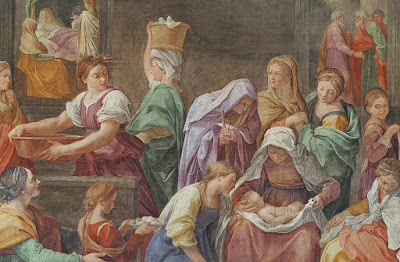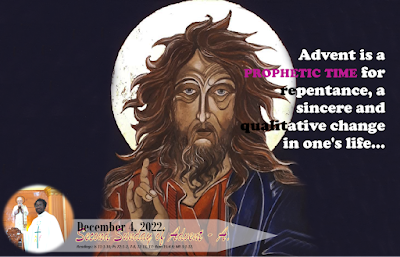Mary, one of us; Mary one with us.
September 8 2019: Nativity of the Blessed Virgin Mary
A Ghanaian proverb says, “One with more firewood than you,
has more ash than you.”
{Note: For reason pf Sunday’s preeminence, today’s feast won’t
be marked. However, we will like to share here, with you, a meditation on the Nativity
of the Blessed Virgin Mary.}
No Marian celebration is biblically found. That is one of
the best critics’ people always raise against Catholics. And today’s feast won’t
be an exception. Nowhere in the Bible will you find a mention of the nativity
of the Blessed Virgin Mary. Do not bother yourself searching for biblical
references.
For some people, the Bible seems to be an Encyclopedia, a
book of answer to all questions. They have a certain understanding of the Bible
leading them to never believe anything which is not mentioned in the Holy Bible.
Is worth of faith, only what is Biblically found. That is their axiom. A kind
of logic with a unique syllogism: ‘the Bible says! So, it is!’ This
understanding prevents them, unfortunately, to see beyond and before the Bible.
Without diminishing the divine and singular authority of the
Scriptures, does the Bible talk about everything? The Second Vatican Council in
the dogmatic constitution on Divine Revelation (Dei Verbum) will answer to this
question talking of the relation between the living Tradition (vivae totius
Ecclesiae Traditionis) and the Scripture (Scriptura). The Vatican document
states rightly that, Tradition is prior to Scripture and this explains why it
has to be called on to give a better explanation, especially of the implicit
content of Scripture. We can therefore not separate what the Bible says from
what tradition, the historical and cultural background of the Jewish people
says or lives. The right interpretation of Scripture would be made by taking together
and reconciling Scriptures with Tradition. And Dei Verbum will affirm, “This
sacred tradition, therefore, and Sacred Scripture of both the Old and New Testaments
are like a mirror in which the pilgrim Church on earth looks at God, from whom
she has received everything, until she is brought finally to see Him as He is,
face to face (see 1 John 3:2)” DV7.
This detour we made, before reaching to the point of today
celebration is aim to only one thing, explain that, though not Biblically
found, today’s feast has all its sense and importance in our relation with God.
It is not an expression of idolatry neither making of Mary an equal to God.
This feast of today is traditional rooted. The introduction
of the Roman Missal states that, “today’s feast originated in Jerusalem the end
of the fifth century. With the whole Church we honor Mary, the Mother of Jesus.
She was chosen in a special way to be the handmaid of the Lord and to play an
important part in the history of salvation and in the mystery of our
redemption.”
Thus, we are celebrating Mary, known on the account of Tradition
as the daughter of Anne and Joachim; the one the God will choose to be the Mother
of our Lord and Savior Jesus-Christ. Mary did not come down from heaven as an
Angel. God did not parachute her on earth. She was born in a human family, a
humble and pious family. Though unmentioned in the Scriptures, but a family which
existed and was known by the people of that time.
Mary, therefore was one of us, because born like each one of
us from a father and mother fully human. Mary is also one with us because
submitted and subjected to God’s salvation plan. Nevertheless, she will be made
special instrument and part of that divine plan.
Celebrating today’s feast, the word of God given for our
meditation talks of the fulfilment of God’s plan of salvation. The Prophet
Micah has a prophetic vision of the coming of the Son of David. He talks of his
birth in Bethlehem Ephrathah, of “the time when she who is to give birth has
borne, and the rest of his brethren shall return to the children of Israel.”
That is the Messianic time, the time of the restauration. The Gospel of Matthew
(Mt 2:6) will identify that Son of David to the child born of Mary, Jesus. So, the
one in labor pains will consequently be none else, but Mary. She is the one who
will give birth to the author of human’s salvation. At his coming, our world shall
experience the peace foresaw by Micah. With him, will be the time for peace on earth.
But, before this will take place, God prepared for himself a mother. Thus, Mary’s
birth in a human family.
Paul in the second reading talks of predestination. We read,
“that all things work for good for those who love God, who are called according
to his purpose. For those he foreknew he also predestined…” Mary actually was
called for God’s purpose. Therefore, he predestined her to be the Mother of his
firstborn. Here we foresee the mystery of the immaculate conception. God
preserved the womb which would bring forth his Son from the stain of sin.
The Gospel passage is the narration of the Genealogy of
Jesus. And there, we see the role of Mary clearly mentioned. Matthew say, “of
her was born Jesus who is called the Messiah.”
As we can read and see through this feast, though we are
celebrating the nativity of the Blessed Virgin Mary, all is about Jesus. That is
right. Because, Mary, actually, is nothing without Jesus. Mary became great
because of what the Lord did with her, choosing her to become his Mother. She stands
therefore, not as an end, but as a means, an instrument in the hands of God. Mary
is God’s channel to mankind. She also becomes our channel toward Jesus her Son.
Mary is not the finality of our faith, but an instrument, a helper in our
journey of faith. Therefore, this beautiful calling of her, as Mediatrix or Auxiliatrix.
Her nativity foreshadows the nativity of the Lord. She is
born to be instrument of God for the unfolding of the mystery of our salvation.
She is one us; chosen to be one with God for us. She, therefore, has more
responsibility than each one of us in the fulfilment of the mystery of salvation.




Comments
Post a Comment